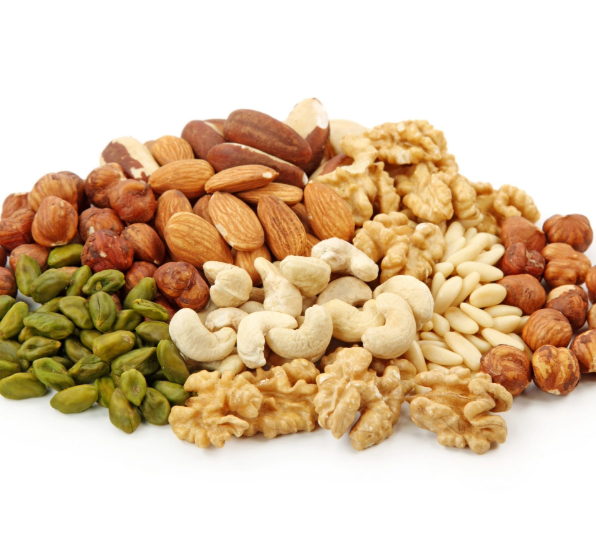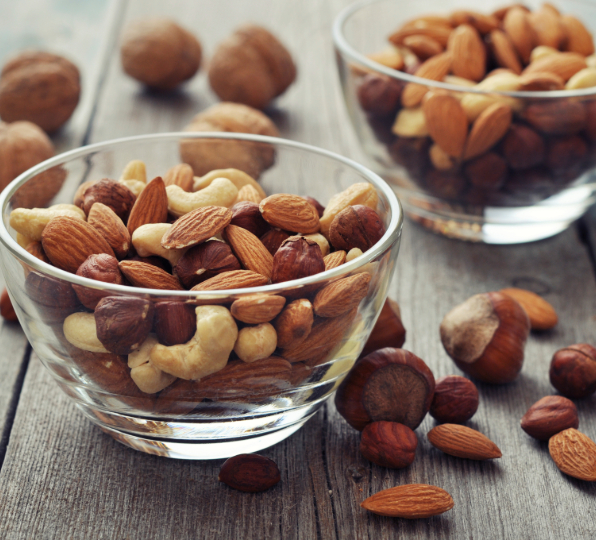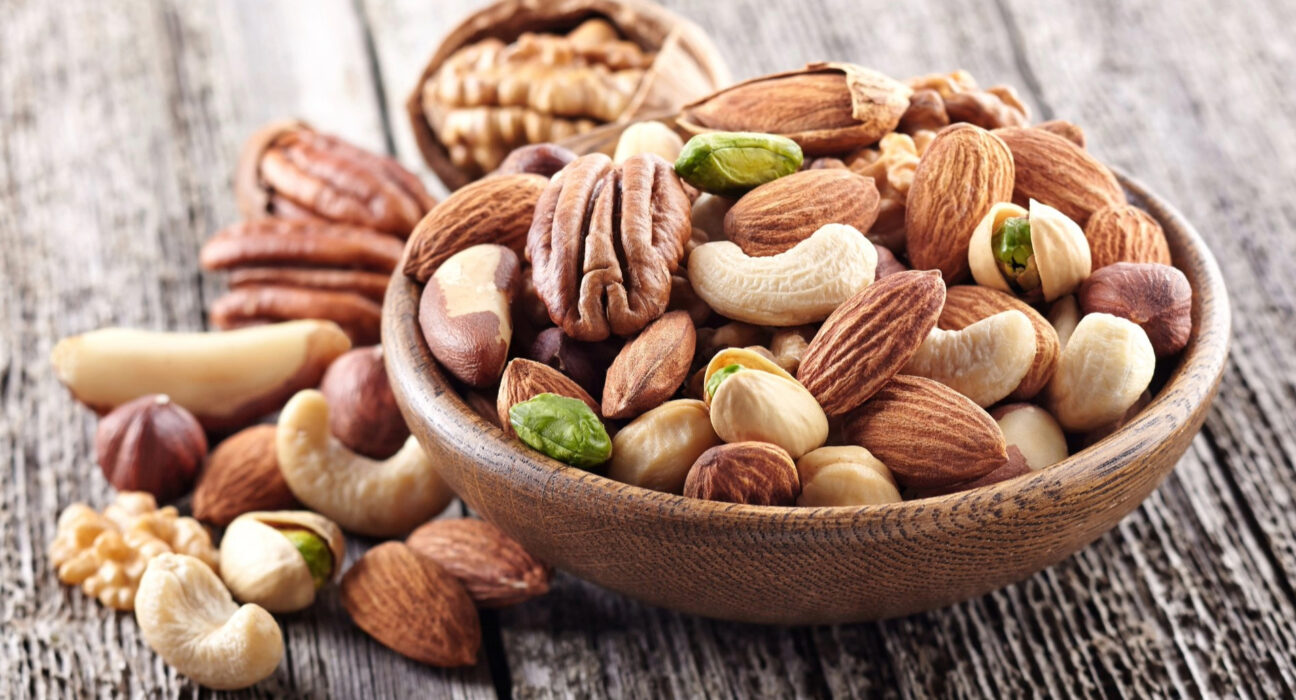Introduction:
Nutritious powerhouses, tree nuts are brimming with vital nutrients and health advantages. Tree nuts, such as cashews, pistachios, and walnuts, can improve your general health and wellbeing when you include them in your diet on a regular basis. This post will discuss the many benefits of including tree nuts in your diet as well as offer helpful advice on how to incorporate them into your routine.
1. Nutrient Density
Tree nuts, including almonds, walnuts, cashews, pistachios, and pecans, are renowned for their exceptional nutrient density. Packed with a diverse array of essential nutrients, these crunchy gems offer a wealth of health benefits when consumed as part of a balanced diet.
One of the key nutritional attributes of tree nuts is their high protein content. Protein is essential for building and repairing tissues, synthesizing hormones and enzymes, and supporting immune function. Tree nuts provide plant-based protein, making them an excellent choice for vegetarians, vegans, and those looking to reduce their intake of animal products.
In addition to protein, tree nuts are rich in healthy fats, particularly monounsaturated and polyunsaturated fats, including omega-3 and omega-6 fatty acids. These heart-healthy fats play a crucial role in reducing inflammation, lowering cholesterol levels, and supporting brain function. Incorporating tree nuts into your diet can help promote cardiovascular health and reduce the risk of chronic diseases such as heart disease and stroke.
Tree nuts are also a good source of dietary fiber, which is important for digestive health, weight management, and blood sugar regulation. Fiber helps promote feelings of fullness and satiety, preventing overeating and aiding in weight loss or maintenance. Additionally, fiber supports regular bowel movements and helps prevent constipation and other digestive issues.
Furthermore, tree nuts are packed with vitamins and minerals that are essential for overall health and vitality. They are particularly rich in vitamin E, an antioxidant that helps protect cells from damage caused by free radicals. Tree nuts also provide important minerals such as magnesium, potassium, calcium, and zinc, which play key roles in bone health, muscle function, and immune support.
2. Heart Health Benefits
The heart health benefits of tree nuts have garnered significant attention from researchers and health experts alike. These nutrient-packed gems, including almonds, walnuts, pistachios, and others, offer a wealth of properties that promote cardiovascular well-being.
One of the standout features of tree nuts is their composition of heart-healthy fats, primarily monounsaturated and polyunsaturated fats. These fats have been shown to help reduce levels of LDL (low-density lipoprotein) cholesterol, often referred to as “bad” cholesterol, while simultaneously increasing levels of HDL (high-density lipoprotein) cholesterol, known as “good” cholesterol. By improving the ratio of LDL to HDL cholesterol, tree nuts contribute to better heart health and a reduced risk of cardiovascular disease.
Furthermore, tree nuts are rich in antioxidants and other bioactive compounds that offer protective effects against heart disease. For instance, they contain vitamin E, a potent antioxidant that helps prevent the oxidation of LDL cholesterol, which can lead to the formation of plaque in the arteries. Additionally, tree nuts contain flavonoids, phenolic compounds, and phytosterols, all of which have been associated with cardiovascular benefits, including improved blood vessel function, reduced inflammation, and enhanced endothelial health.
Numerous studies have provided compelling evidence of the cardiovascular benefits of consuming tree nuts. Large-scale observational studies, such as the Nurses’ Health Study and the Health Professionals Follow-Up Study, have consistently shown that individuals who regularly consume tree nuts have a lower risk of developing heart disease compared to those who consume them infrequently or not at all. Moreover, randomized controlled trials have demonstrated that incorporating tree nuts into the diet can lead to improvements in lipid profiles, blood pressure, and other markers of cardiovascular health.
3.Weight Management Support
While it may seem counterintuitive, incorporating tree nuts into your diet can actually support weight management efforts, thanks to their unique nutritional profile and satiating properties. Despite being calorie-dense, numerous studies suggest that tree nuts can be beneficial for those looking to maintain or even lose weight when consumed as part of a well-rounded diet.
One of the key factors contributing to the weight management potential of tree nuts is their rich protein content. Protein is known for its ability to increase feelings of fullness and promote satiety, ultimately reducing the desire to overeat. Tree nuts, such as almonds, pistachios, and cashews, are all excellent sources of plant-based protein, making them a satisfying snack choice that can help curb hunger between meals.
In addition to protein, tree nuts are packed with dietary fiber, another nutrient that plays a crucial role in promoting feelings of fullness and aiding in weight management. Fiber adds bulk to the diet, slowing down digestion and promoting a sense of satiety that can help prevent overeating. Furthermore, fiber-rich foods like tree nuts have been associated with improved digestive health and better regulation of blood sugar levels, both of which are important factors in maintaining a healthy weight.
Moreover, the healthy fats found in tree nuts, including monounsaturated and polyunsaturated fats, contribute to their satiating effect. These fats not only add flavor and texture to meals and snacks but also help slow down the emptying of the stomach, keeping you feeling fuller for longer periods.
Several large-scale studies have supported the weight management benefits of consuming tree nuts. For example, research published in the American Journal of Clinical Nutrition found that individuals who regularly consumed tree nuts had a lower risk of weight gain over time compared to those who rarely or never ate them.
4. Blood Sugar Control
The low glycemic index (GI), high fiber content, and balanced macronutrient profile of tree nuts make them an excellent choice for promoting blood sugar control and reducing the risk of type 2 diabetes. Despite their relatively high fat content, tree nuts have minimal impact on blood sugar levels due to their slow digestion and absorption, making them a valuable addition to a diabetic-friendly diet.
One of the key factors contributing to the blood sugar-regulating properties of tree nuts is their low glycemic index. The glycemic index is a measure of how quickly a carbohydrate-containing food raises blood sugar levels. Foods with a low GI, such as tree nuts, are digested and absorbed slowly, resulting in gradual increases in blood glucose levels and better blood sugar control over time.
Additionally, tree nuts are rich in dietary fiber, a nutrient that plays a crucial role in regulating blood sugar levels. Fiber slows down the digestion and absorption of carbohydrates, preventing rapid spikes in blood glucose levels after meals. By promoting slower gastric emptying and delaying the release of glucose into the bloodstream, fiber helps maintain more stable blood sugar levels throughout the day.
Furthermore, the protein content of tree nuts also contributes to their blood sugar-stabilizing effects. Protein helps increase feelings of fullness and satiety, reducing the overall glycemic response to a meal and preventing excessive postprandial spikes in blood sugar levels. Additionally, protein stimulates the release of glucagon, a hormone that opposes the action of insulin and helps regulate blood glucose levels.
Several studies have demonstrated the beneficial effects of tree nuts on blood sugar control and insulin sensitivity. For example, a systematic review and meta-analysis published in the American Journal of Clinical Nutrition found that incorporating tree nuts into the diet was associated with improved glycemic control and reduced insulin resistance in individuals with type 2 diabetes.
5. Brain Health Support
The nutritional composition of tree nuts, including their omega-3 fatty acids, antioxidants, vitamins, and minerals, makes them a valuable dietary addition for supporting brain health and cognitive function throughout life. Incorporating tree nuts into your daily diet can provide numerous benefits for cognitive performance and may even help reduce the risk of age-related cognitive decline.
Omega-3 fatty acids, such as alpha-linolenic acid (ALA), eicosapentaenoic acid (EPA), and docosahexaenoic acid (DHA), are essential nutrients that play a critical role in brain health. DHA, in particular, is highly concentrated in the brain and is essential for maintaining the structure and function of brain cell membranes. Tree nuts, such as walnuts and almonds, are rich sources of ALA, which can be converted into EPA and DHA in the body, albeit to a lesser extent than marine sources. Including tree nuts in your diet can help provide a steady supply of omega-3 fatty acids to support brain function and protect against cognitive decline.
Antioxidants are compounds that help protect cells from oxidative damage caused by free radicals, which can contribute to age-related cognitive decline and neurodegenerative diseases such as Alzheimer’s disease. Tree nuts are packed with antioxidants, including vitamin E, flavonoids, and polyphenols, which have been shown to have neuroprotective effects and may help preserve cognitive function as you age. Studies suggest that regular consumption of nuts, particularly walnuts, may be associated with better cognitive performance and a reduced risk of cognitive impairment in older adults.
Furthermore, tree nuts are rich in other nutrients that are essential for brain health, such as vitamin B6, folate, and magnesium. These nutrients play key roles in neurotransmitter synthesis, DNA repair, and neuronal function, all of which are crucial for maintaining cognitive function and mental clarity.
How to Add Tree Nuts to Your Daily Diet:
- Snack Smart:
- Enjoy a handful of mixed nuts as a nutritious and satisfying snack between meals. Choose unsalted or lightly salted varieties to minimize sodium intake.
- Incorporate into Meals:
- Add chopped nuts to salads, oatmeal, yogurt, or stir-fries for an extra crunch and boost of nutrition. Toasting nuts before adding them to dishes can enhance their flavor and aroma.
- Blend into Smoothies:
- Blend nuts such as almonds or cashews into smoothies for added creaminess, protein, and healthy fats. Nut butters can also be used as a delicious and nutritious addition to smoothies.
- Use as a Topping:
- Sprinkle chopped nuts over cereal, granola, or roasted vegetables for added texture and flavor. You can also use crushed nuts as a coating for baked or grilled meats and fish.
- Bake with Nuts:
- Incorporate chopped nuts into baked goods such as muffins, bread, cookies, and bars for added texture, flavor, and nutrition. Experiment with different nut varieties to find your favorite combinations.


Conclusion:
Adding tree nuts to your daily diet is a simple yet effective way to boost nutrition and support overall health and well-being. Whether enjoyed as a snack, added to meals, or used in cooking and baking, tree nuts offer a wide range of health benefits, including improved heart health, weight management support, blood sugar control, and brain health support. By incorporating a variety of tree nuts into your diet on a regular basis, you can enjoy their delicious flavor and reap the numerous health benefits they have to offer. So why not start adding more tree nuts to your daily diet today and nourish your body from the inside out?












